The UK and Russian Educational Systems Comparison
Introduction, private schools, relations between the teacher and the pupil, social background, reference list.
The education system of Great Britain is famous for its unique traditions. Having such well known education establishments as Oxford, Cambridge, and having rather high educational standards, especially in the sphere of higher education, taking the 2 place in Europe, education system of the United Kingdom however, has its own drawbacks and negative tendencies. One of the best ways to analyze something is to compare it with the other thing, as drawbacks and benefits can be better seen against the background of the fundamentally-different education system. In this terms Russian education system is the best choice.
Derived from the educational system of the former USSR, which was considered to be one of the best in the world, now it is being changed in order to correspond to the demands of the modern society. Being quite opposite in their nature, these two systems have too many different things to compare, that is why we will stop only on some of them, which are considered to be the most interesting. The first thing to be compared is the presence of the private schools, the payment for education and the role private schools play in the further obtaining of the education. The next thing is the relationships between the teacher and the pupils, their level of mutual understanding. The influence of the pupil’s background on the quality of the obtaining education will be the last thing to be compared.
One of the most significant achievements of the former USSR was its ability to provide absolutely free education for all people in this giant country. Russia, as the main successor of that country, has inherited this achievement, providing free education too
The citizens of the Russian Federation have the right to free primary education, basic and secondary general education, and to vocational education; and on a competitive basis, to free non-university and university level higher educational and to postgraduate education in State and municipal educational establishments. ( State policy in regard to education n.d., para 9)
The percentage of the private schools and universities is extremely low in Russian educational system and they are not of the great significance. Their few number is explained by the fact, that the fashion to the private education establishments has come to Russia not so long ago. The graduates from these schools do not have other advantages of the graduates from the public schools and additionally the study is to be paid for. Better conditions and, as a result, better level of obtaining knowledge, are still not enough to attract parents.
In Great Britain things are totally opposite. The higher education in the UK is fee-paid for foreigners and its citizens. In the sphere of secondary education the private and public schools exist. However, as against Russia, the graduate from the private school has the great advantage of the graduate from public – “the most prestigious 100 schools secure 30% of all Oxbridge places. And 84 of them are private schools” (Dorling 2014, para. 2). Having analysed the facts, we observe the great difference in the importance of the private schools for the education system in Russia and Great Britain.
The other point under the consideration is the relationships between the teacher and his pupils. There is a tendency in the world for the growing intention in their relations and Great Britain is not an exception. The humanistic society is too focused on the children rights, forgetting about their duties. As a result children grow with the realization of their permissiveness The teacher is no more authority and it is very difficult to find some leverage over them.
Teachers are very constrained in the remedies as private schools are interested in pupils. In Russia however, the teacher had always had authority with children and their family. The situation remains the same in the whole, however there is a tendency for its changing. The pupils obtain more and more independence and assurance in their privileged state while the teacher loses his authority. The situation becomes more like in Great Britain, children do not appreciate the relations with the teacher, just putting their interests in the head.
The last point to be compared is the influence of the children background on their ability to get further education. “Variations in school performance in the UK are also heavily determined by the social backgrounds of pupils” (Green, Mason, Unwin 2011, para. 5). Children, whose parents have a degree, will more likely enter the University than children whose parents do not. The representative of the lover class cannot afford private school, automatically reducing his children chances of getting the good education. Also there is “the gap in educational achievement between poorer and richer students” (Galindo, Marcenaro-Gutierrez, Vignoles 2004, para. 4).
In Russia the influence of the childs background becomes more and more obvious, its education system now provide better opportunities for those, who are able to afford it – “children got a good education depended heavily on their individual teachers and on how wealthy their families were” (Samedova & Ostaptschuk 2012, para. 1). Profitable connections and big money open the doors to any University. Russian educational system is very corrupted, that is why childs background plays the great role in it. If to compare it with the situation in Great Britain, it becomes obvious that things are even worse, as it the UK the principles of fair competitions work, while in Russia, being nominally free, education depends on the financial state of the family.
In conclusion it is possible to come to admit that the educational systems in Russia and Great Britain are totally different. Starting from the different approach to the financial aspect of the education and ending with the relations between the teacher and his pupils. However, modern processes in society led to some changes in the structure of the education systems and common things appeared – the opening of the private schools in Russia and the change in the teacher-pupil relations are those points which are common for two different educational systems.
Dorling, D, 2014, Is the British education system designed to polarise people? Web.
Green, A, Mason, G, Unwin, L, 2011, ‘Education and Inequality: Introduction’, National Institute Economic Review , vol. 215, n.pag., Web.
Galindo, R, F, Marcenaro-Gutierrez, O, Vignoles, A 2004, ‘The Widening Socio-Economic Gap in UK Higher Education’, National Institute Economic Review , vol. 190, n.pag., Web.
Samedova, E, & Ostaptschuk, M 2012, Russia: An educational system in crisis , Web.
State policy in regard to education, n.d.,Web.
Cite this paper
- Chicago (N-B)
- Chicago (A-D)
StudyCorgi. (2020, October 4). The UK and Russian Educational Systems Comparison. https://studycorgi.com/the-uk-and-russian-educational-systems-comparison/
"The UK and Russian Educational Systems Comparison." StudyCorgi , 4 Oct. 2020, studycorgi.com/the-uk-and-russian-educational-systems-comparison/.
StudyCorgi . (2020) 'The UK and Russian Educational Systems Comparison'. 4 October.
1. StudyCorgi . "The UK and Russian Educational Systems Comparison." October 4, 2020. https://studycorgi.com/the-uk-and-russian-educational-systems-comparison/.
Bibliography
StudyCorgi . "The UK and Russian Educational Systems Comparison." October 4, 2020. https://studycorgi.com/the-uk-and-russian-educational-systems-comparison/.
StudyCorgi . 2020. "The UK and Russian Educational Systems Comparison." October 4, 2020. https://studycorgi.com/the-uk-and-russian-educational-systems-comparison/.
This paper, “The UK and Russian Educational Systems Comparison”, was written and voluntary submitted to our free essay database by a straight-A student. Please ensure you properly reference the paper if you're using it to write your assignment.
Before publication, the StudyCorgi editorial team proofread and checked the paper to make sure it meets the highest standards in terms of grammar, punctuation, style, fact accuracy, copyright issues, and inclusive language. Last updated: February 15, 2022 .
If you are the author of this paper and no longer wish to have it published on StudyCorgi, request the removal . Please use the “ Donate your paper ” form to submit an essay.
- About School
- The Founder and History
- School Management
- Accreditations
- Information About The Organisation
- Our partners
- Contact Details
- International Programme
- Russian Programme
- Extracurricular Activities
- Academic Results
- Tuition fees
- Open house days
- Fill out the request for the Russian programme
- Fill out the request form to English National curriculum
- School №1 from 2 to 7 years
- School №2 from 7 to 11 years
- School №3 from 11 to 18 years
- School №5 from 4 to 18 years
- School №7 from 11 to 18 years
- School №9 from 3 to 11 years
- Student Community
- BIS Alumni Community
- Video gallery
- Mass media about us
- Our Schools
- Communities
- +7 (495) 987-44-86
- +7 (495) 426-03-11
- [email protected]

The Russian Educational System vs the British One
In this article let's find out the differences between the Russian educational system and the British one.
Often, open-minded parents look for a replacement for the Russian school system, seeing obvious flaws in it. A good alternative would be a British school. Such education is highly valued in many countries: England occupies the first position in the world’s best universities ranking.
The structure of the educational system
Kindergarten.
The first difference is that a kindergarten in Russia is usually an independent institution, while in the UK, children can go to school from the age of 3. There, several stages of preschool preparation are organised for them, each of them has its own pedagogical goals.
At the British International School , for example, there are 2 groups where we prepare children for basic education: Nursery and Reception. The teachers communicate with the children in English, but just in case there is a Russian-speaking assistant in the class.
Primary And Secondary School
Children are admitted to Russian primary schools from the age of 6-7, while in the UK, children enter the first grade at the age of 5. This is obligatory for everyone.
Secondary education is compulsory in both the Russian and British systems. Pupils at a comprehensive school in Russia can receive a certificate after the 9th grade, whereas in the UK it’s only after the 11th grade. Years 10 and 11 are devoted to studying the IGCSE programme. At the end there are exams. After successfully passing them, an international certificate of secondary education is given. This is the last stage of compulsory general education in the UK.
Pre-University Training
Some schools offer pre-university training in Years 12 and 13. By the way, BIS is the only one in Moscow that offers its students two international programmes to choose from: IB Diploma and A-level . They each last for 2 years and are highly regarded by universities around the world.
Holidays and School Calendar
In a typical Russian school, each academic year consists of 4 quarters of 2–2.5 months. Senior students attend classes 6 days a week, younger students go to school 5 days a week. After each quarter, children go on holiday, which lasts a week-and-a-half. At the end of the year, the longest break is as long as 3 months.
In the UK, they study by trimesters. In the middle of each trimester is a week of rest, or half-term break. There are long holidays between terms: 6 weeks in summer, and 2–3 for Easter and Christmas. Children go to school 5 days a week regardless of age.
Study Load and Programme Slant
In these aspects, the school systems of Russia and the UK differ greatly.
First of all, the British curriculum is structured completely differently. The older the students, the fewer compulsory subjects. From the very beginning, this system helps students to determine their areas of interest and to choose subjects useful for future work. The Russian system is the opposite. In the first grade, only basic subjects are studied, and more new subjects are added every year. The goal of the Russian educational system is to broaden students’ horizons as much as possible, whereas the British one helps to choose the future profession.
The second great difference is the approach to teaching. You can often hear about the individual approach in Russian schools, but it is important to understand that it is hardly possible to implement it there. It is all about the number of students in a class. In Russia, there are 25 and sometimes 30 people. In Great Britain it is 15–20. Therefore, British parents can be sure that their children will definitely be able to receive material adapted to their individual abilities, and the teacher will have enough time for everyone.
In addition, the focus of the educational programme is different. From an early age, the British are brought up to be responsible and independent, while Russian children are brought up to be patient, you cannot say otherwise. In Russia, schoolchildren get a huge number of homework assignments, many of them require learning by heart. In a British school, on the contrary, they encourage children to research, to find information by themselves and to come to conclusions. In the classroom, they discuss - not retell - textbooks. A great deal of time is devoted to creative tasks.
The British International School has been working in Moscow for 30 years and teaches children according to the national curriculum of England. Our experience shows that the British educational system is truly progressive. It gives not only deep academic knowledge, but prepares students for further study, work and adult life.
MORE TO READ:
Benefits of studying at an international school
How to make your child interested in learning English?
Soft skills for children
- Share full article
Advertisement
Supported by
Britain Pursues More Muscular Role in Standoff With Russia on Ukraine
With a late-night announcement about Russian meddling in Ukraine, the U.K. signaled its aim to be a player in Europe’s security crisis — even as scandals besiege Prime Minister Boris Johnson.

By Mark Landler
LONDON — Britain seized the world’s attention on Saturday by accusing President Vladimir V. Putin of plotting to install a pro-Russian leader in Ukraine, a dramatic late-night announcement that instantly thrust it on to the front lines of the most dangerous security crisis in Europe in decades.
British officials say its release of sensitive intelligence was calculated to foil a potential plot and to send a message to Mr. Putin. They cast it as part of a concerted strategy to be a muscular player in Europe’s showdown with Russia — a role it has played since Winston Churchill warned of an “Iron Curtain” after World War II.
And yet Britain’s moves also bear the imprint of a country eager to set itself apart, two years after it left the European Union. When Secretary of State Antony J. Blinken landed in Kyiv last week for talks about Russian troops massing on Ukraine’s border, his plane taxied past a Royal Air Force C-17 cargo plane that had just finished unloading antitank weapons for the Ukrainian military.
“The U.K. is differentiating itself from Germany and France, and to some extent, even the U.S.,” said Malcolm Chalmers, the deputy director general of the Royal United Services Institute, a think tank in London. “That comes out of Brexit, and the sense that we have to define ourselves as an independent middle power.”
The theatrical timing and cloak-and-dagger nature of the intelligence disclosure, which came in the midst of a roiling political scandal at home, raised a more cynical question: whether some in the British government were simply eager to deflect attention from the problems that threaten to topple Prime Minister Boris Johnson.
Either way, Britain is moving on multiple fronts. It is preparing legislation that would enable it to impose sanctions if Mr. Putin carries out an invasion. It dispatched senior ministers to other NATO countries menaced by Russia. And it has begun engaging directly with Moscow, with reports that its foreign and defense secretaries plan to meet their Russian counterparts in the coming weeks.
Britain’s hard-edge approach was crystallized in a punchy essay by the defense secretary, Ben Wallace. Writing in The Times of London , Mr. Wallace rejected Mr. Putin’s claims of encirclement by NATO and accused the Russian leader of crude “ethnonationalism,” based on what he called the bogus claim that Russians and Ukrainians are one people. The essay made waves in Washington and in European capitals.
“Whether Britain is in the E.U. or out of the E.U., it is always going to push back on Russian bad behavior,” Karen Pierce, the British ambassador to the United States, said in an interview. “Where the Russians are concerned, you’ll always find the U.K. at the forward end of the spectrum.”
But Mr. Wallace is not the leader of Britain’s government — Mr. Johnson is. And the prime minister is caught up in an increasingly desperate campaign to save his job amid a scandal over Downing Street parties that violated coronavirus restrictions. Not only has this political circus crowded out public debate over the British role in Ukraine, but it has also stoked suspicion that Mr. Johnson would welcome a distraction from the flood of pesky questions about garden parties.
Even Saturday’s announcement about a possible coup in Ukraine appeared timed to grab headlines in the Sunday morning papers and airtime on the news shows. Britain rarely declassifies intelligence in this manner, unlike the United States, though it has done so before on issues involving Russia.
“There is no distraction as enticing as war,” wrote Simon Jenkins , a columnist for The Guardian, adding that the only thing more dangerous than a populist leader in trouble was two populists in trouble — in this case, he asserted, Mr. Putin and Mr. Johnson.
Some Conservative lawmakers warn that Britain cannot afford a messy leadership battle at a time like this. Tough talk about Russia also appeals to the Tory right, and critics say some ambitious officials are taking advantage of the tensions.
During a visit to British troops in Estonia in November, the foreign secretary, Liz Truss, posed in military gear atop a tank. Commentators said she looked like she was channeling Margaret Thatcher , which may not be a bad strategy for someone rumored as a potential replacement for Mr. Johnson.
At the same time, there are ample historical and strategic reasons for Britain to take a hard line with Russia. British officials have been furious with the Kremlin since the poisoning of a former Russian intelligence agent and his daughter in Salisbury , England, with a nerve agent in 2018, an operation that Britain blamed on Russia’s military intelligence and that led the British to expel about 150 diplomats.
The Russians have returned Britain’s antipathy, viewing it as the leading edge of American efforts to curb its ambitions and dismissing criticism from British officials as moral posturing, given their country’s imperial past. Britain has done little to stop Russian billionaires from using London as a haven, where they buy up Mayfair real estate and influence in the House of Lords .
While Mr. Johnson has not been as full-throated as his defense secretary, he said on Thursday that “any kind of incursion” by Russia “would be a disaster — not just for Ukraine but for Russia, a disaster for the world.”
The prime minister, preoccupied by his political woes, has largely ceded the stage on Ukraine policy to Mr. Wallace, a British Army veteran who was security minister at the time of the Salisbury attacks. In June, Mr. Wallace deployed a Navy destroyer, H.M.S. Defender, to sail close to the coast of Russian-occupied Crimea in the Black Sea. Russian planes buzzed the ship in protest.
Britain’s action, analysts said, was deliberately aggressive, reflecting a frustration among military officials that its policy has been too reactive to Russia’s serial provocations. These go beyond the Salisbury attack to accusations that Moscow meddles in British elections and has corrupted its politics with dirty money.
Ambassador Pierce pointed out that Britain conducted an independent foreign policy even when it was a member of the European Union. It did, however, take part in E.U.-wide sanctions when it was part of the bloc, something it will no longer do after Brexit. Officials said that was why the government needed to draft new legislation to target Russian individuals and its financial services sector.
Beyond that, analysts said Britain’s determination to be assertive also reflected its post-Brexit identity. Kim Darroch, who was national security adviser under Prime Minister David Cameron, said Britain once refused to supply weapons to Ukraine because it feared they could end up in the wrong hands. Now, those concerns are outweighed by the advantages of acting independently.
“I suspect this is part of showing we’re not bound up with the European Union, which is led by the far more equivocal German view on Russia,” said Mr. Darroch, who later served as ambassador to the United States.
Germany’s equivocation helps explains why the R.A.F. planes carrying the antitank weapons to Ukraine flew a circuitous route across Denmark, avoiding German airspace. A senior British official said that reflected Britain’s close consultations with Denmark and Sweden, and that London did not ask the Germans for permission because it would have delayed a mission that depended on speed.
“The most interesting thing is what it says about how frayed the U.K.-German relationship is,” said Jeremy Shapiro, research director at the European Council on Foreign Relations. “The disunity was on display for everyone who could track the planes.”
Ms. Truss also skipped a meeting in Berlin with Mr. Blinken and her counterparts from Germany and France to discuss Ukraine, sending her deputy. Instead, she traveled to Australia, where she and Mr. Wallace met with officials to discuss a new submarine alliance with Australia, Britain and the United States.
That seemed an odd choice in the midst of a mushrooming European crisis. But it underscored Britain’s commitment to Asia, another cornerstone of Britain’s post-Brexit foreign policy. It also, analysts said, helped Britain avoid the perception of being unduly subservient to the United States.
“They have to work carefully not to be seen as a poodle,” Mr. Shapiro said. “They want to show that they are an extra-regional player.”
Michael Schwirtz and Michael Crowley contributed reporting from Kyiv, Ukraine, and Anton Troianovski from Moscow.
Mark Landler is the London bureau chief. In 27 years at The Times, he has been bureau chief in Hong Kong and Frankfurt, White House correspondent, diplomatic correspondent, European economic correspondent, and a business reporter in New York. More about Mark Landler
- Bahasa Indonesia
- Slovenščina
- Science & Tech
- Russian Kitchen
What was the most bitter Russian-British war?
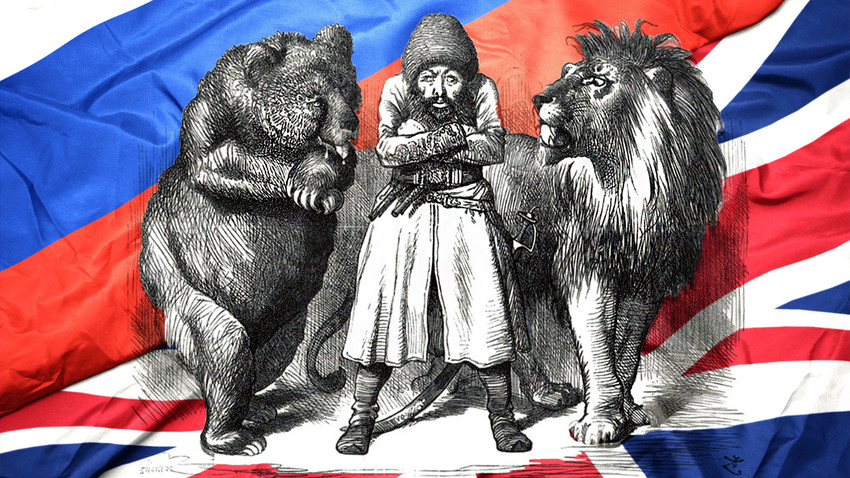
1. Seven Years’ War (1756-1763)
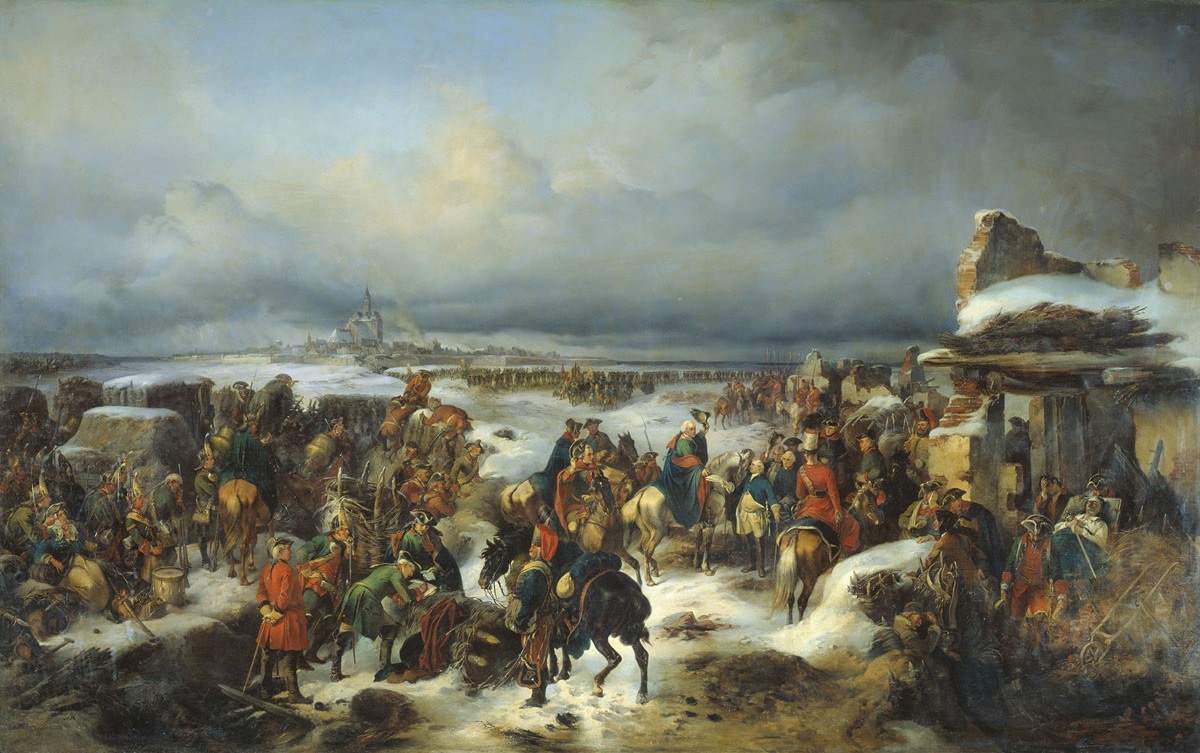
The fall of fortress Kolberg in 1761 (Seven Years' War) to Russian troops.
Confronting each other in one of the bloodiest wars of the 18th century, Russia and Great Britain, however, never actually met on the battlefield in the process. While the British fought their traditional rival France on land and sea, their ally, the Prussian king Frederick the Great, dealt with the Russians and Austrians.
When the exhausted Prussia was on the brink of collapse in 1761, the so-called “Miracle of the House of Brandenburg” occurred. The deceased Empress Elizabeth of Russia was succeeded by Peter III, a native German and a big admirer of Frederick. He immediately made peace with the Prussians and returned them the conquered East Prussia, reducing all Russia’s successes to zero.
Despite the fact that Peter III was soon overthrown, the war for Russia was over. Losing over 130,000 soldiers, it got nothing in return, except for high military prestige. The United Kingdom, for its part, after defeating France and seizing its vast territories in North America, turned into the greatest colonial superpower.
2. Russian Indian Campaign (1801)
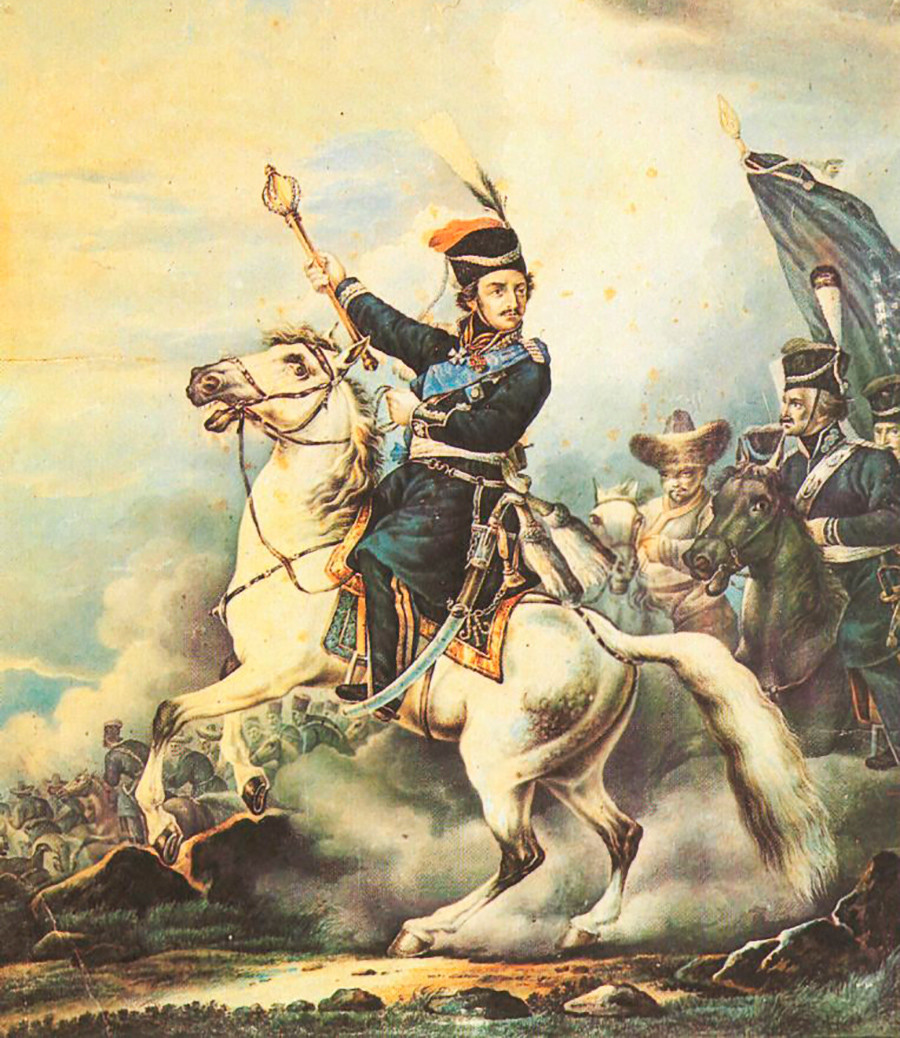
Ataman Matvey Platov
The joint long-term Russian-British fight against Napoleon and revolutionary France was interrupted in 1800 because of tiny Malta. Having liberated the island from the French, the British kept it for themselves instead of returning it to the Knights of Malta.
Russian Emperor Paul I, who was Grand Master of the order, took this as a personal insult. Dramatically changing the course of his foreign policy, he befriended the former enemy, Napoleon, and together with the French ruler planned a joint campaign into India , the British Empire’s main source of wealth.
22,000 Cossacks were sent towards India, while a joint 70,000 Russian-French army, commanded by André Masséna, was due to follow. However, on March 23, 1801, Paul I was murdered as a result of court intrigue in which Britain played an active role. The new ruler, Alexander I, recalled the Cossacks and immediately restored allied ties with the British.
3. Anglo-Russian War (1807-1812)
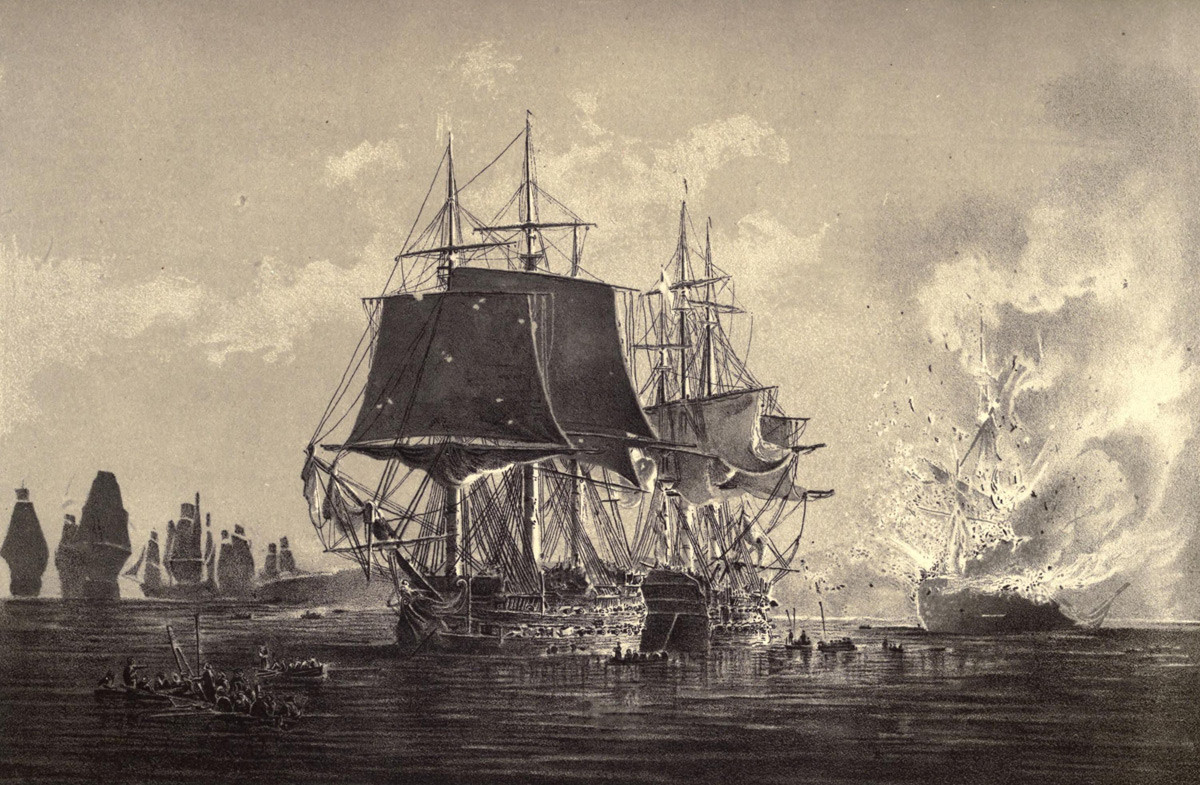
The Russian Ship Vsevolod, after the action with the Implacable, destroyed in the presence of the Russian Fleet. Rogerwick bay 1808.
When on June 14, 1807, Napoleon defeated the Russian army in the Battle of Friedland, Emperor Alexander I was forced to conclude a peace treaty with the French and join the Continental Blockade, aimed at paralyzing British commerce.
For several years the former allies waged a naval war in the Baltic and White seas. The British attacked and captured enemy merchant and warships, pillaged Russia’s coast, and tried to blockade its ports. The confrontation never led to large-scaled naval battles, being limited to isolated duels.
The hostilities peaked during the war between Russia and Britain-supported Sweden, which lost Finland as a result. Since 1811, the Russians and British had been in secret negotiations on lifting the blockade, so detrimental to both of them. With Napoleon's invasion of Russia in 1812, this unnecessary war was finally over.
4. Crimean War (1853-1856)
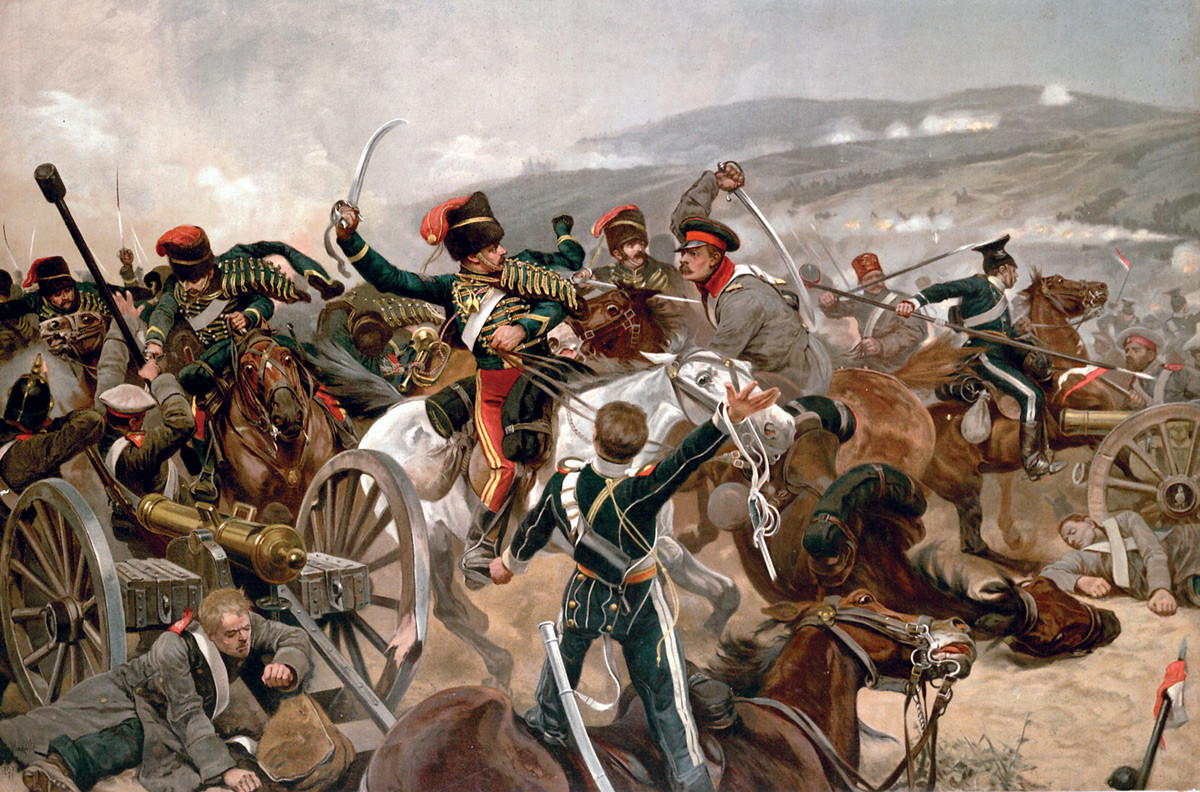
British cavalry charging against Russian forces at Balaclava
In the mid-19th century the Russian Empire had its sights set on taking advantage of the weak Ottoman Empire and gaining a foothold in the Balkans. Such intentions were, however, opposed by a coalition of Great Britain, France and the Kingdom of Sardinia.
Despite the name, the war was fought not only in Crimea, but also in the Balkans, the Baltic Sea, the Russian North and even the Russian Far East. The technically backward Russian troops could do little against the joint forces of the Great Powers, and after three years of conflict they suffered a bitter defeat.
The war severely undermined Russia’s international standing, not to mention losing the right to station a fleet on the Black Sea. On the other hand, the defeat opened the eyes of the Russian leadership, who launched a wide range of military and economic reforms in the country.
5. Great Game
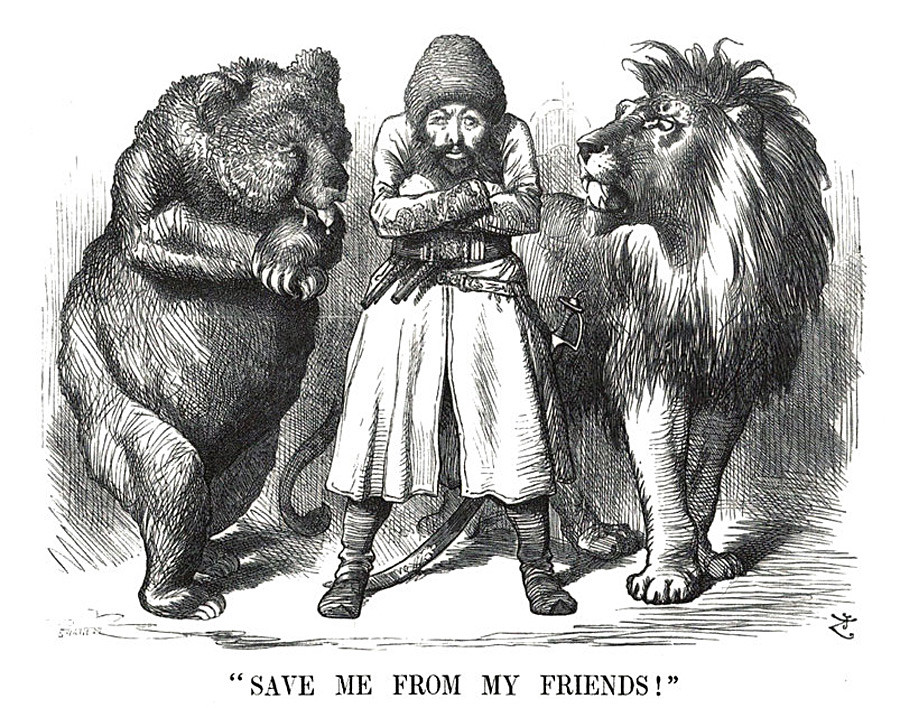
The Great Game: the Afghan Emir Sher Ali Khan with his "friends" Russia and Great Britain.
In the 19th century, the whole vast region of Central and Southern Asia became an arena of confrontation between the Russian and British empires. Absorbing small and weak local nations and states, they fought each other politically and diplomatically, waging spy and proxy wars.
So as not to allow this peculiar “cold war” to turn into open hostilities, the Russians and British avoided the establishment of joint borders, always leaving a line of buffer states between them.
When in the early 20th century the danger emanating from the German Empire became obvious, the two old rivals overcame their misunderstandings and launched cooperation within the Triple Entente. The focus switched from Asia to Europe, where World War I had already showed up at the doorstep.
6. Allied Intervention in Russia
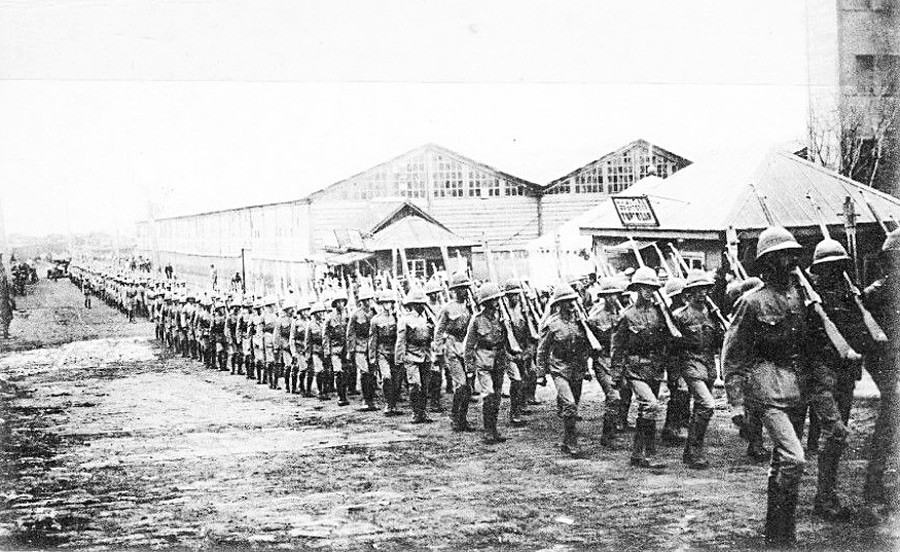
Landing of the British troops in Vladivostok
In 1917, drowning in the chaos of the Civil War, Russia became a tidbit for foreign countries. Officially proclaiming support for the White movement in the Civil War and the struggle against Bolshevism, the interventionists were more concentrated on their political and military expansion into Russia, seeking to further weaken their geopolitical rival and exclude it from the world arena for years, if not for decades to come.
Great Britain’s participation was the largest in the Allied intervention. Along with its dominions (Canada and Australia), Britain sent 40,000 soldiers, who captured the main ports and cities in the Russian North, South and East.
The interventionists preferred to avoid open clashes with the Bolsheviks, favoring the role of spectator. When the Whites were crushed by the Red Army and discontent with the intervention became too high in their own countries, the Great Powers evacuated their expeditionary forces. By summer 1920, no British soldier was left in Russia.
If using any of Russia Beyond's content, partly or in full, always provide an active hyperlink to the original material.
to our newsletter!
Get the week's best stories straight to your inbox
- How did Russia’s ‘fleet of lunatics’ almost start a war with Great Britain?
- The Bear vs the Lion: 5 times Russia and Britain were on the eve of war
- Six wars and conflicts when Russia and UK acted as allies
This website uses cookies. Click here to find out more.
Content Search
Overview of the current state of education and science in ukraine in terms of russian aggression (as of september 05 – 25, 2022) [en/uk].
- Govt. Ukraine
Attachments

General information
According to the Office of the UN High Commissioner for Refugees (UNHCR) as of September 20, 2022 the number of refugees fled Ukraine for other countries since 24.02.2022 is more than 13,08 million persons.
According to the Prosecutor General's Office of Ukraine as of September 24, 2022, since the beginning of the war, 391 children have been killed and 773 wounded. This data does not include data from areas where the active hostilities take place.
As of September 23, 2022, 2551 educational institutions have been damaged by bombing and shelling, 291 of them are completely destroyed.
On September 06, 2022, the MoES representatives held an online meeting with German Federal Ministry of Education and Research staff. During the meeting the practical issues of education process organization for forcibly displaced Ukrainian school students and students were discussed.
On September 08, 2022, Minister of Education and Science of Ukraine Serhiy Shkarlet participated in the annual Conference of universities of the United Kingdom of Great Britain and Northern Ireland - 2022.
During the meeting the participants discussed the state and perspectives of Ukrainian higher education development in terms of russian war against Ukraine. The Minister Serhiy Shkarlet informed that within the framework of the large-scale unification initiative, the "Twinning" project has already united almost 90 Ukrainian universities with foreign higher education institutions for long-term cooperation in various areas, and currently 144 universities from Ukraine have registered to participate in the project.
Thanks to the support of the Association of Universities of the United Kingdom, leading British universities joined the project, and their example intensified the interest in the event of universities in the EU, Canada, the USA, Australia and New Zealand. The government of Great Britain has announced financial support for the activities of partners within this project.
Also, 5 million pounds has been allocated for Ukrainian-British research projects of universities participating in the initiative; the "XTH Market" company announced grant support to universities with a total value of 15 million pounds for a period of 3 years; the German Academic Exchange Service (DAAD) is going to join "Twinning" with more than 20 German universities ready to become partners of Ukrainian higher education institutions; Cormack Consultancy Group invested more than 140 thousand pounds in the implementation of the project. Minister Serhiy Shkarlet expressed his gratitude to the British partners for comprehensive help and full support of Ukraine in various fields, in particular in education and science.
On September 08, 2022, the online meeting between Serhiy Shkarlet, the Minister of Education and Science of Ukraine, and João Costa, Minister of Education of Portugal, took place. During the meeting the challenges for Ukrainian education and scientific systems in the conditions of full-scale russian military aggression were discussed, in particular providing the access to Ukrainian education for displaced school students and students from Ukraine.
Minister Serhiy Shkarlet expressed his gratitude to Portuguese colleague for comprehensive support of Ukrainian education process participants and education and scientific employees, residing in Portugal, assistance in preparation for holding in Lisbon the National Multidisciplinary Test for Ukrainian entrants.
The Minister of Education of the Portuguese Republic informed that currently about 15 thousand Ukrainian children temporarily displaced from Ukraine reside in Portugal and only about 4 thousand Ukrainian children are registered in Portuguese schools. Minister João Costa also informed that all necessary measures are currently being taken to integrate Ukrainian children into the Portuguese education system.
Related Content
Ukraine + 14 more
Ukraine Situation Flash Update #69 (16 May 2024)
Unicef ukraine humanitarian situation report no. 39 - april 2024, ms. lisa doughten, ocha director of financing and partnerships division, on behalf of usg for humanitarian affairs and erc, mr. martin griffiths - briefing to the security council on the humanitarian situation in ukraine, 14 may 2024, ukraine: situation report, 14 may 2024 [en/uk].

- My presentations
Auth with social network:
Download presentation
We think you have liked this presentation. If you wish to download it, please recommend it to your friends in any social system. Share buttons are a little bit lower. Thank you!
Presentation is loading. Please wait.
School Education in Russia and Great Britain
Published by David Walters Modified over 5 years ago
Similar presentations
Presentation on theme: "School Education in Russia and Great Britain"— Presentation transcript:
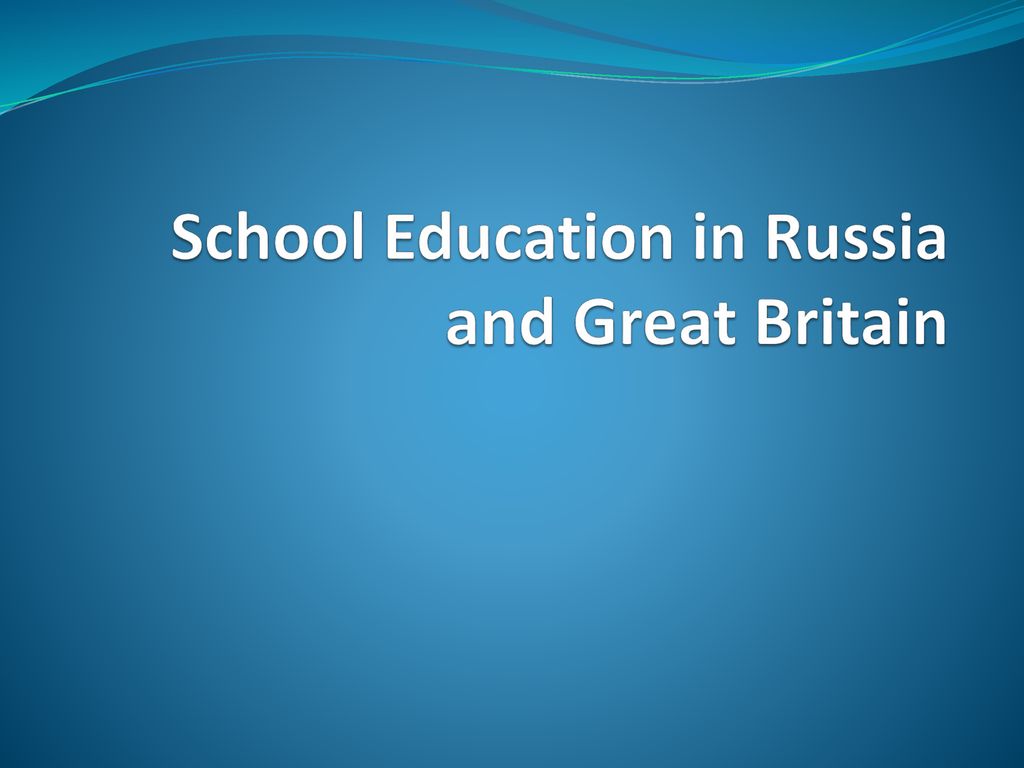
Unit 1 School life In this unit, you will

Pre-school education School education – basic and secondary - Two terms - The school year starts on 15 September and ends in May, June or July (depends.

The Project: “Education in Great Britain, in the USA and in Russia: the common features and distinctions” The author: Grachova Y, (pupil of the 9th“a”

THE STRUCTURE OF THE EDUCATION SYSTEM IN GREECE Education in Greece is divided in: Compulsory for all children 6-15 years old and Post-compulsory for the.

American system of education

Slovene education system. Pre-school Attended by 1-5 year olds Optional Divided into creche and kindergarten Both are optional.

British system of education. The School System Primary School Age Age 11 exam Secondary School Age GSCE Six Form Age Age 18 exam.

The system of education. Vocabulary School attendance- školní docházka Compulsory- povinný Vocational school- odborná škola Apprentice school - učňovská.

Education in Hungary Secondary school 14 years old-18 years old

Major Differences between Czech and British Educational System.

The South Korean education system, as in many other education systems, consists of five levels: preschool, primary, secondary, higher and continuing education.

Slovakia, Great Britain, The USA

British system of education. The School System The School System Primary School Age 6-11 Age 11 exam Primary School Age 6-11 Age 11 exam Secondary School.

gymnasium, technical, vocational Matura, school-leaving exams

From Pre-K to Graduate School EDUCATION IN THE U.S.A.

American Education System

SCHOOL SYSTEM An overview of the Czech, British and US systems.

Choosing your Future Profession Presentation by Irina Postyka and pupils of 8 “a” grade Krasnodar 2010.

SCHOOLING IN RUSSIA.
About project
© 2024 SlidePlayer.com Inc. All rights reserved.
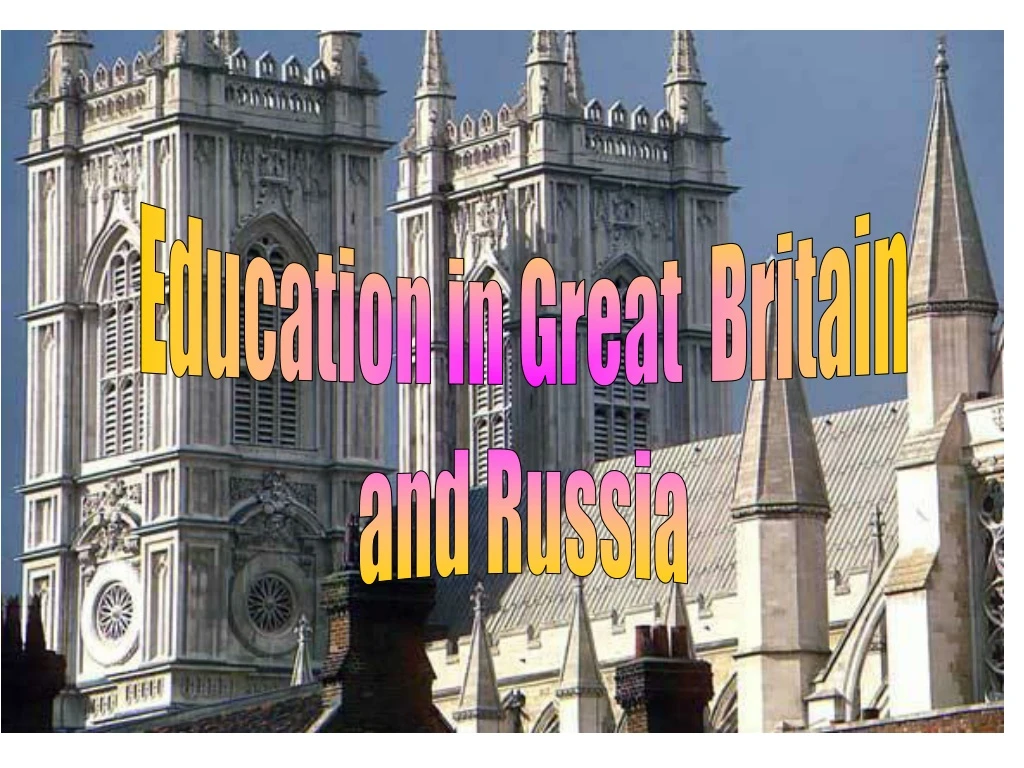
Education in Great Britain and Russia
Dec 20, 2019
70 likes | 110 Views
Education in Great Britain and Russia. Repeat after the speaker. compulsory is guaranteed by the Constitution intelligent tests through to show a preference primary education secondary education. Answer my questions:. At what ages must British children stay at school?
Share Presentation
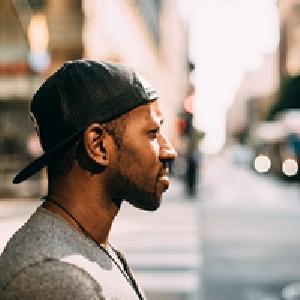
EDUCATION IN GREAT BRITAIN
EDUCATION IN GREAT BRITAIN. INTRODUCTION. by law education compulsory until 16 years old children can be educated at home free for all children from 5 to 16 all government-run schools, follow the same National Curriculum = set plans
607 views • 25 slides

University Education in Russia and Great Britain
University Education in Russia and Great Britain. It is never too late to learn. Answer the questions:. What universities in Russia do you know? What universities in GB do you know? Which university would you prefer to study at and why?.
359 views • 20 slides
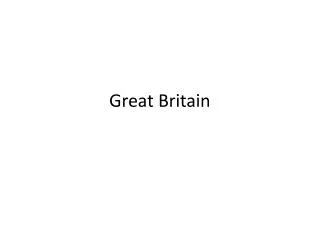
Great Britain
Great Britain. Great Britain. Great Britain is made up of the countries of England, Scotland and Wales. The Kingdom of Great Britain was established on 1 st May 1707 when the three countries signed the Acts of Union.
1.23k views • 28 slides
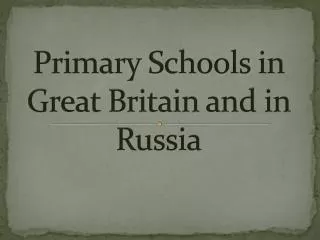
Primary Schools in Great Britain and in Russia
Primary Schools in Great Britain and in Russia. In Great Britain school begins at the age of four or five . In Russia school usually begins at the age of 7. Many boys and girls usually leave school at the age of sixteen.
698 views • 18 slides
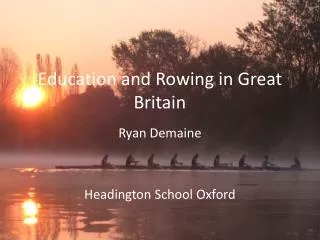
Education and Rowing in Great Britain
Education and Rowing in Great Britain. Ryan Demaine Headington School Oxford. Ryan Demaine. Director of Rowing Headington School. WJ 8+ gold at World Junior Championships ’10. WJ 2- gold at the Youth Olympics ‘10. Top rowing school at the National Schools Regatta ‘10.
610 views • 40 slides

GREAT BRITAIN
GREAT BRITAIN. The United Kingdom of Great Britain and Northern Ireland. The UK consists of four main parts which are: England, Scotland, Wales and Northern Ireland. Their capitals are London, Edinburgh, Cardiff and Belfast. Language.
1.32k views • 22 slides

Great Britain
Great Britain . Clothing. Costumes- very much a western society they wear very much the same as any other modern western such as jeans and tee shirts to full business suits for office work. Some of the ladies wear corsets all the time for show.
378 views • 7 slides

Germany. France. Russia. Great Britain . The Race That Led to WWI. Revolutions That Rocked Europe.
338 views • 12 slides
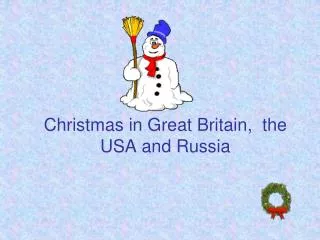
Christmas in Great Britain , the USA and Russia
Christmas in Great Britain , the USA and Russia. Content. About Christmas in Great Britain and the USA Real Christmas in England Christmas’ tree About London’s celebrity Christmas Christmas in Russia Traditions of Christmas in Russia Secrets of Christmas traditions Pictures.
556 views • 12 slides

GREAT BRITAIN. Vypracovali: Janka Gurínová Ivana Janoušková. MAP. BRITAIN. There are several names for Britain : Britain , Great Britain , United Kingdom (UK) There are four countries in the UK: England , Scotland , Wales and Northern Ireland. FLAG.
936 views • 11 slides
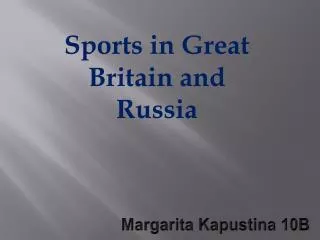
Sports in Great Britain and Russia
Sports in Great Britain and Russia. Margarita Kapustina 10B. Sports in Great Britain and Russia
729 views • 22 slides

Long live friendship between Russia and Great Britain!
Long live friendship between Russia and Great Britain!. We love peace and hate war. NO!!!. Yes!!!.
335 views • 24 slides


in Great Britain
in Great Britain. Easter is the most important Christian festival in the United Kingdom of Great Britain . It is a celebration full of folklore , tradition and dishes.
299 views • 9 slides
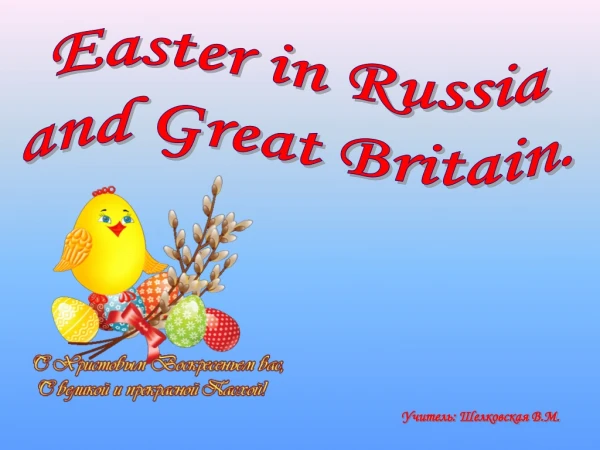
163 views • 14 slides
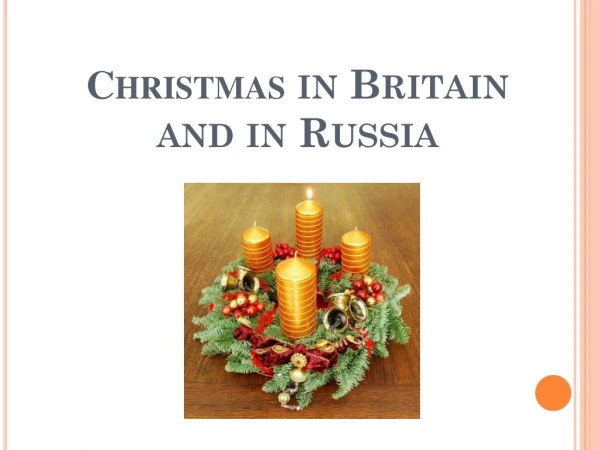
Christmas in Britain and in Russia
Christmas in Britain and in Russia. Listen and repeat. Ch ristmas, de c orate, c onsist, de c oration, c apital, c arol C ity, c enter, c entral, De c ember Th e 25 th of December, the 24 th of December, th e 7 th of January L o ndon, L o ndoner, c o lour, m o ney.
168 views • 16 slides
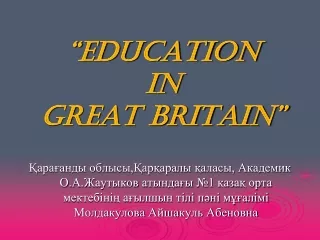
Secondary Education in Great Britain
Secondary Education in Great Britain. State schools - are free -schools provide their pupils with books and equipment for their studies a bout 93 percent of all children. Private schools ( Independent schools ) -parents pay money for these schools
182 views • 14 slides
Watch CBS News
Spectacular photos show the northern lights around the world
By Emily Mae Czachor
May 12, 2024 / 11:09 AM EDT / CBS News
A series of powerful solar storms colored skies across the Northern Hemisphere this weekend, as people witnessed brilliant displays of the northern lights in the United States, Canada, Europe, China and beyond. Officials have said the dazzling light shows could continue for several more days.
The aurora borealis — the phenomenon more commonly known as the northern lights — happens because of a molecular collision in the upper levels of Earth's atmosphere that causes bursts of energy to be released in the form of visible light. The aurora borealis has a counterpart, the aurora australis, or southern lights, which is the same phenomenon in the southern hemisphere. These light shows can be visible for as much as half the year in certain places near either of the planet's two poles, but it's uncommon to see them in areas that are closer to the equator, which is why the spectacles over North America , Europe and other places on similar latitutdes were such a treat in the last few days.
The aurora will extend from the poles toward the equator in periods of intense space weather activity, and it has been known in the past to reach as far as the continental U.S. when the activity is particularly extreme. That was the case over the weekend, as an unusually strong geomagnetic storm reached Earth and set the stage for a string of explosive nighttime scenes world over. The geomagnetic storm that arrived on Friday was a historic G5 , the highest level on a ranking scale that starts at G1, according to the National Oceanic and Atmospheric Administration.
Additional Aurora sightings (weather permitting) may be possible this evening into tomorrow! A Geomagnetic Storm Watch has been issued for Sunday, May 12th. Periods of G4-G5 geomagnetic storms are likely! 👀 https://t.co/iibFBuyzXo — National Weather Service (@NWS) May 11, 2024
A solar storm of that size has not come into contact with Earth in decades. It arrived in the midst of a parade of coronal mass ejections — eruptions of magnetic field and other solar material from the Sun's corona that can cause geomagnetic storms — which continued to fuel the northern lights shows throughout Friday and Saturday. The next bursts of solar material are expected to arrive at Earth midday on Sunday , according to NOAA's Space Weather Prediction Center, which issued a geomagnetic storm watch in anticipation of G4 or G5 events likely following those upcoming coronal mass ejections.
"Watches at this level are very rare," the space weather prediction center said in an advisory on Saturday. It noted that the oncoming solar activity could potentially cause the aurora to "become visible over much of the northern half of the country, and maybe as far south as Alabama to northern California."
Ahead of the next round of solar flares, here's a look at some brilliant auroras that have materialized so far this weekend in different parts of the world.

- National Oceanic and Atmospheric Administration
- Aurora Borealis
- Northern Lights
Emily Mae Czachor is a reporter and news editor at CBSNews.com. She covers breaking news, often focusing on crime and extreme weather. Emily Mae has previously written for outlets including the Los Angeles Times, BuzzFeed and Newsweek.
More from CBS News

Solar storms can affect electronics and the power grid – an expert explains

Alleged archaeological theft at national park caught on camera
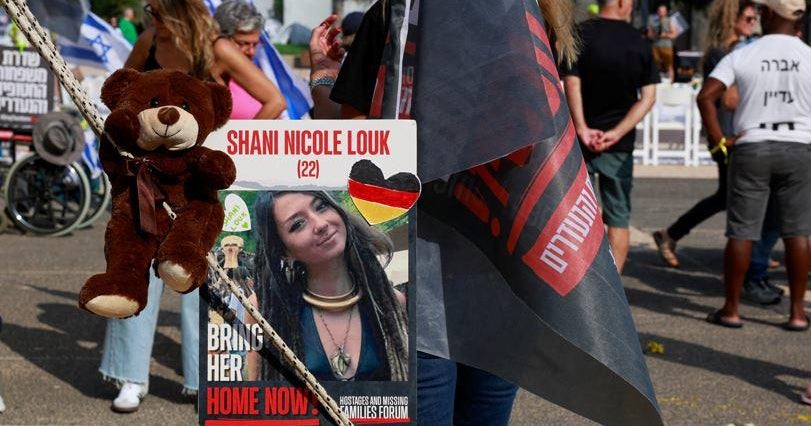
Bodies of three hostages recovered by Israeli forces in Gaza

Education in russia and great britain
Education is very important in the modern world, which is full of technological advances.
All countries have traditional systems of education, according to which pupils start school at the age of 5, 6 or 7 and study at school for 11 or 12 years. This system of education seems good because pupils are taught by well-qualified teachers and they get the necessary amount of knowledge specified by a national curriculum. But some people believe that the current system is a failure because it doesn’t teach children how to become good thinkers. School is about passing exams, but education should be about life.
In many countries education is compulsory, but school isn’t. So many parents choose alternative ways of education for their children, for example, home education. Everyone continues studying after finishing school. There is no doubt that without good education you won’t be able to find an interesting and highly-paid job because every company needs well-qualified employees. University life is usually interesting and exciting.
Education in Russia
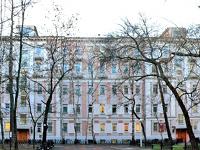
In Russia there is a nine-year compulsory education, but to enter a university one has to study two years more. School starts at the age of 6 or 7 for Russian children. At school pupils study academic subjects, such as Russian, Literature, Mathematics, History, Biology, foreign languages and others.
After finishing secondary school, lyceum or gymnasium one can go on to higher education. Entrance competitive examinations are held in July and August.
Higher educational institutions are headed by Rectors. Prorectors are in charge of the academic and scientific work. Higher educational institutions train undergraduates and graduate students in one or several specializations. The faculties are headed by the Deans.
Institutions of higher education include: technical training schools, teachers training colleges, universities which offer master’s and doctoral degrees programs. The faculties have specialized councils for conferring advanced academic degrees.
Who is Charlie Dobson? All about the 24-year-old sprinter who clocked Great Britain's sixth fastest 400m at the Meeting Citta Di Savona 2024
C harlie Dobson is a sprinter who represents Great Britain in international events. He recently rose to fame after clocking a personal best time of 44.46s in the men's 400m at the 2024 Meeting Citta Di Savona in Italy.
With this, he also shattered the meet record in the event which was previously established by Italian sprinter Davide Re, who clocked a time of 45.31s.
This performance by Dobson also placed him sixth on the list of the fastest 400m timings clocked by a sprinter from Great Britain and Northern Ireland in the event's history. The three-time World Championships medalist Matthew Hudson-Smith owns the fastest timing over the distance with a sensational European Record of 44.26s.
Iwan Thomas (44.36s), Roger Black (44.37s), Mark Richardson (44.37s), and Martyn Rooney (44.45s), are the only athletes who have better timings than Dobson.
As the 2024 Paris Olympics is nearing, Dobson has now become one of the exciting prospects to look out for. So, let's dive deeper into knowing about the 24-year-old who made headlines at the 2024 Meeting Citta Di Savona.
Charlie Dobson's hometown
Dobson was born on October 20, 1999, in Colchester, Essex, England.
Charlie Dobson's education
Dobson went to St Benedict's Catholic College and then attended Colchester Sixth Form College. He pursued aeronautical engineering from Loughborough University.
Charlie Dobson's junior Athletics career
Dobson bagged a silver medal at the 2018 World U20 Athletics Championships in Tampere, Finland, by finishing second behind compatriot Jona Efoloko (20.48s) with a time of 20.57s. Additionally, he established the British Universities & Colleges Sport record over the 60m short sprint event.
Charlie Dobson's prominent achievements
Dobson was a key member of Great Britain and Northern Ireland's 4x400m squad that won the bronze medal at the 2023 World Athletics Championships in Budapest.
He and his teammates Alex Haydock-Wilson, Lewis Davey, and Rio Mitcham ran a 2:58.71 to achieve third place, behind the USA (2:57.31) and France (2:58.45).
In addition, he played a crucial role in earning the gold medal for Great Britain at the 2022 European Championships in Munich. He and his teammates Hudson-Smith, Davey, and Haydock-Wilson produced a season-best performance of 2:59.35 to win the event.
He also narrowly missed out on a podium finish in the men's 200m with a fourth-place finish, clocking 20.34s. His compatriot Zharnel Hughes clinched the gold in a season-best time of 20.07s. Notably, Dobson owns a personal best of 20.19s in the 200m which he achieved in 2022.

We've detected unusual activity from your computer network
To continue, please click the box below to let us know you're not a robot.
Why did this happen?
Please make sure your browser supports JavaScript and cookies and that you are not blocking them from loading. For more information you can review our Terms of Service and Cookie Policy .
For inquiries related to this message please contact our support team and provide the reference ID below.

Your Child’s Best Future Starts Here this Summer

Luxury Living Penthouse with Panoramic Views in South Pasadena

Curtains Up on Pasadena Playhouse’s 2024-2025 Season

Here Are Current Bestsellers at Southern California’s Independent Bookstores

Pasadena Humane Supporter Will Quadruple Kindness

The Best Events In Pasadena This Weekend

Heaven Comes to the Arroyo Seco

All Saints Church to Host Centennial Dance Party
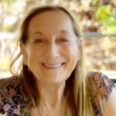
Armory to Honor “heARTful HERO” Gale Kohl

Kids Activities in Pasadena This Week

Parents! Find the Best School for Your Children
Latest guides.

Caltech Professor Elected to Royal Society of Great Britain

Ares Rosakis, Caltech's Theodore von Karman Professor of Aeronautics and Mechanical Engineering
Ares Rosakis , Caltech’s Theodore von Kármán Professor of Aeronautics and Mechanical Engineering, has been named a foreign member of the Royal Society, the United Kingdom’s national academy of sciences. Founded in 1660 under the patronage of King Charles II, the Royal Society is the oldest scientific academy in continuous existence. Rosakis is among 94 inductees to the society this year, including 22 new foreign members. His election brings to six the number of fellows and foreign members of the Royal Society currently on the Caltech faculty.
“I am pleased to welcome such an outstanding group into the Fellowship of the Royal Society,” said Sir Adrian Smith, president of the Royal Society, in a prepared statement . “This new cohort have already made significant contributions to our understanding of the world around us and continue to push the boundaries of possibility in academic research and industry. From visualising the sharp rise in global temperatures since the industrial revolution to leading the response to the Covid-19 pandemic, their diverse range of expertise is furthering human understanding and helping to address some of our greatest challenges.”
Rosakis is a highly interdisciplinary engineer known for inventing multiple high-speed diagnostic methods for studying failure phenomena at all length and timescales. His research interests range from the mechanics and physics of earthquake rupture processes to the physical processes involved in the catastrophic failure of aerospace materials to the reliability of microelectronic and optoelectronic structures and devices. In 1989, he was the first to observe the phenomenon of intersonic shear delamination in impact-loaded composites and bi-materials, and in 2000, he experimentally discovered the existence of supershear earthquake ruptures (in which the speed of the frictional rupture exceeds the velocity of seismic shear waves) with Hiroo Kanamori, the John E. and Hazel S. Smits Professor of Geophysics, Emeritus. He later pioneered the use of laboratory earthquakes and scaling to resolve paradoxes in earthquake science and to study supershear earthquakes worldwide, including the catastrophic magnitude-7.8 earthquake that struck Turkey and Syria on February 6, 2023.
Rosakis earned his bachelor’s degree from the University of Oxford in 1978 and his master’s and doctoral degrees from Brown University in 1980 and 1982, respectively. He joined the Caltech faculty as an assistant professor in 1982, became an associate professor in 1988, and a professor in 1993. He was named the von Kármán Professor in 2004 and served as the director of GALCIT from 2004 to 2009, chair of the Division of Engineering and Applied Science from 2009 to 2015, and as the Booth Leadership Chair from 2013 to 2015.
Rosakis has received numerous honors and awards throughout his career. He was elected to the National Academy of Sciences in 2016 and is also a member of the National Academy of Engineering, a fellow of the American Academy of Arts and Sciences, the historic Academy of Athens, the Indian National Academy of Engineering, and three European academies. He has also received the William M. Murray Lecture (2005) from the Society of Experimental Mechanics, the Eringen Medal (2011) from The Society of Engineering Science, the Theodore von Kármán Medal (2016) from the American Society of Civil Engineers, and the Timoshenko Medal (2018) of the American Society of Mechanical Engineers, the highest honors awarded by these societies. In 2012, he was named Commandeur dans l’Ordre des Palmes Académiques by the Republic of France, and in 2021, Brown University awarded him with the Horace Mann Medal, recognizing him as an outstanding alumnus.
Get our daily Pasadena newspaper in your email box. Free.
Get all the latest Pasadena news, more than 10 fresh stories daily, 7 days a week at 7 a.m.
Make a comment
Your email address will not be published. Required fields are marked *
Name (required)
Mail (required) (not be published)
Top of the News

In Pasadena, a Rallying Cry for Mental Health Awareness

Pasadena Man Disarms Home Invasion Robber, Stabs Him With His Own Knife

Five Pasadena Unified School District Teachers Honored With 2024 Teachers of Excellence Award
Breaking News Tips: (626) 737-8486 Extension 7 E-mail press release to : [email protected] Fax press release to : (888) 650-9712
James Macpherson, Co-Publisher | [email protected] (626) 737-8486 Ext. 7
Candice Merrill, Co-Publisher | [email protected] (626) 737-8486 Ext. 4
Faith Fernandez, Chief Administrative Officer | [email protected] (626) 737-8486 Ext. 801
Editorial Department
André Coleman, Managing Editor | [email protected] (626) 737-8486 Ext. 2
David Cross | [email protected] (626) 737-8486 Ext. 8
Eddie Rivera | [email protected] (626) 737-8486 Ext. 82
Sales and Sales Manager
RSS (Really Simple Syndication) feeds offer another way to get Pasadena Now content. Subscribe to our feeds to get the latest headlines, summaries and links back to full articles – formatted for your favorite feed reader and updated throughout the day.
- News Main Stories
- Nonprofits News
- Photo Story
- Public Safety

IMAGES
VIDEO
COMMENTS
The System of education in Great Britain is rather complicated. By law, children in G.B. go to school at the age of 5. They go to Infant school for two years. At the age of 7 they go to Junior school. So, English children get their Primary education during 6 years. At the age of 11 they take the so-called 11+ examination (Eleven plus exam).
In Russia all colleges, universities and academies provide the intramural (full-time), extramural (part-time) and distance forms of study. The two last allow students to combine higher education in Russia with work activities. In Great Britain college and university students are trained only full-time, so as not to be distracted from lectures ...
Let's start. In Great Britain things are totally opposite. The higher education in the UK is fee-paid for foreigners and its citizens. In the sphere of secondary education the private and public schools exist. However, as against Russia, the graduate from the private school has the great advantage of the graduate from public - "the most ...
According to government data, federal spending on education decreased by 8.5 percent between 2014 and 2016, from 616.8 billion rubles to 564.3 billion rubles (USD $10 billion). Demographic pressures: The number of college- and university-age students in Russia has plummeted in recent years.
The second great difference is the approach to teaching. You can often hear about the individual approach in Russian schools, but it is important to understand that it is hardly possible to implement it there. It is all about the number of students in a class. In Russia, there are 25 and sometimes 30 people. In Great Britain it is 15-20.
Surprisingly, Russia is not among the top 20 sources of foreign students in UK higher education, despite the popularity of UK boarding schools among members of Russia's elite. 87 More positively, prior to the outbreak of the COVID-19 pandemic more than 200,000 Russians visited the UK each year, offering opportunities for people-to-people ...
Russia-United Kingdom relations, also Anglo-Russian relations, are the bilateral relations between Russia and the United Kingdom.Formal ties between the courts started in 1553. Russia and Britain became allies against Napoleon in the early-19th century. They were enemies in the Crimean War of the 1850s, and rivals in the Great Game for control of central Asia in the latter half of the 19th ...
The Embassy of the Russian Federation to the United Kingdom of Great Britain and Northern Ireland . Tel.: +44 (0) 20 72431410, +44 (0) 20 72214482 / en . en ru . Embassy ... Education in Russia . History of Russia-UK relations . Embassy history ...
The purpose of my project: To conduct a comparative analysis of the content of Russian secondary education and British secondary education. Educational system in Great Britain: The modern system of education consists of early childhood education, primary education, secondary education, higher education. Across the country a free public ...
Creating the Russian peril: education, the public sphere, and national identity in imperial Germany, 1890-1914 / Our friend "the enemy": elite education in Britain and Germany before World War I. ... Russia (Paddock) and Great Britain (Weber). The authors differ not only in the countries that they choose to examine but also in the ...
By Mark Landler. Jan. 23, 2022. LONDON — Britain seized the world's attention on Saturday by accusing President Vladimir V. Putin of plotting to install a pro-Russian leader in Ukraine, a ...
views in Paul Dukes Catherine the Great and the Russian Nobility. A Study Based on the Materials of the Legislative Commission of 1767. Cambridge 1967, pp. 241-248, and Pa-trick L. Alston Education and the State in Tsarist Russia. Stanford 1969, p. 20. Alexander Vucinich Science in Russian Culture. London 1965, wrote that, "Although the aim of the
In the 1830s, the Russians began to actively establish themselves on the eastern shores of the Caspian Sea and attempted to advance deep into Central Asia by undertaking an unsuccessful campaign ...
Microsoft Word - EDUCATION IN RUSSIA AND THE UNITED STATES.doc. EDUCATION IN RUSSIA AND THE UNITED STATES. MICHELLE MUSSER. EDF 2555. APRIL 28, 2005. Russia and the United States of America have several similarities when it comes to. educational policies. Both countries' systems are based on the German system of education but.
Education in Russia and Great Britain - Free download as Word Doc (.doc / .docx), PDF File (.pdf), Text File (.txt) or read online for free. In this essay the differences between Russian and British education are pointed out.
1. Seven Years' War (1756-1763) The fall of fortress Kolberg in 1761 (Seven Years' War) to Russian troops. Confronting each other in one of the bloodiest wars of the 18th century, Russia and ...
On September 08, 2022, Minister of Education and Science of Ukraine Serhiy Shkarlet participated in the annual Conference of universities of the United Kingdom of Great Britain and Northern ...
The Project: "Education in Great Britain, in the USA and in Russia: the common features and distinctions" The author: Grachova Y, (pupil of the 9th"a" THE STRUCTURE OF THE EDUCATION SYSTEM IN GREECE Education in Greece is divided in: Compulsory for all children 6-15 years old and Post-compulsory for the.
Education in England and in Russia. Education in England and in Russia. I am Julia Begun, a student of 8"B" class from the Moscow region decided to conduct research and learn about the similarities and differences of education in Russia and the UK on the basis of reliable sources. Russia and England - are absolutely different countries.
Education in Great Britain and Russia. Education in Great Britain and Russia. Repeat after the speaker. compulsory is guaranteed by the Constitution intelligent tests through to show a preference primary education secondary education. Answer my questions:. At what ages must British children stay at school? 110 views • 7 slides
The United Kingdom has summoned the Russian ambassador and announced a swathe of new measures against Moscow, including the targeting of Russian-owned buildings that the British government said ...
Primary Schools in Great Britain and in Russia. Primary Schools in Great Britain and in Russia. In Great Britain school begins at the age of four or five . In Russia school usually begins at the age of 7. Many boys and girls usually leave school at the age of sixteen. 697 views • 18 slides
People from the United States and Canada to the United Kingdom, Poland, parts of China and Russia saw the northern lights this weekend. ... Staffordshire, in Great Britain on May 10, 2024.
Study with Quizlet and memorize flashcards containing terms like Define political socialization. Describe two methods Russian authorities use to socialize citizens., Great Britain and Russia have bicameral legislatures with a much stronger lower house, but with different relationships to the executive. a. Describe two functions exercised by both the House of Commons in Great Britain and the ...
Education in russia and great britain. Education is very important in the modern world, which is full of technological advances. All countries have traditional systems of education, according to which pupils start school at the age of 5, 6 or 7 and study at school for 11 or 12 years. This system of education seems good because pupils are taught ...
C harlie Dobson is a sprinter who represents Great Britain in international events. He recently rose to fame after clocking a personal best time of 44.46s in the men's 400m at the 2024 Meeting ...
ROI for cycle routes is big — and it grows over time. According to a recent IPPR report, average returns on investment for cycle routes at £5.62 per pound spent are more than double that of ...
For David Cross, Call (626) 737-8486 Ext. 8 For Advertising, Call (626) 737-8486 Ext. 7 Click for Directory. Pasadena Now has been published daily since April, 2004 and is among the very oldest ...